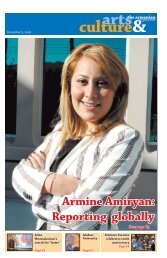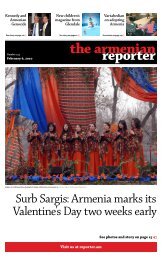National, International, Armenia, and Community News and Opinion
National, International, Armenia, and Community News and Opinion
National, International, Armenia, and Community News and Opinion
- No tags were found...
You also want an ePaper? Increase the reach of your titles
YUMPU automatically turns print PDFs into web optimized ePapers that Google loves.
The <strong>Armenia</strong>n Reporter | May 2, 2009 19CommentaryLiving in<strong>Armenia</strong>The power of the peopleby Maria TitizianLettersWhenever there’s imbalance in the world,events, either natural or artificial, occur thatplace things in their proper order.Political developments in <strong>Armenia</strong> canchange rapidly as can people’s perceptions ofthe world in which they live <strong>and</strong> it can dictatetheir every move.For the past ten months, <strong>Armenia</strong>-Turkeyrapprochement has been on the forefront of<strong>Armenia</strong>’s domestic <strong>and</strong> foreign policy agenda.Football diplomacy became the diplomaticcatchphrase everyone from the UnitedStates to Russia was referring to.Relations with a neighbor with whom wehave deep historical grievances <strong>and</strong> dem<strong>and</strong>swas further compounded when Turkeyslammed the border shut in solidarity withAzerbaijan over the Nagorno Karabakh conflict16 years ago. While an air corridor betweenour two countries exists, l<strong>and</strong> <strong>and</strong> railcrossings have not been realized since 1993.On the morning of April 23, 2009 we wokeup to a different world. <strong>Armenia</strong>’s foreign affairsministry at approximately 1:30 in themorning, Yerevan time had released a statementthat <strong>Armenia</strong> <strong>and</strong> Turkey, throughSwiss mediation had agreed to some elusiveroad map, one which we have yet to fullyunderst<strong>and</strong>. While Turkish media is on afree-for-all, disseminating misinformation,the <strong>Armenia</strong>n media is still scrambling to getanswers from its leadership. That same day,Yerkir Media, a local TV station posed a questionto the foreign affairs ministry, askingwhat the road map was. The answer that theministry later circulated to all media outletsin the country was that in diplomatic lingo,road map means a plan of action, a term oftenused in diplomatic negotiations. No kidding.The Middle East has had a road map forthe past twenty years...All of this one day before the 94th anniversaryof the greatest tragedy in our collectivehistory. The <strong>Armenia</strong>n Genocide is anintrinsic component of our national identity.It’s the one issue that unites us among a divergenceof opinions regarding every aspectof our nationhood.I have walked to Tsitsernagaberd, theGenocide memorial in Yerevan for the pastnine years with my compatriots. Every year Ihave witnessed the solemn journey that <strong>Armenia</strong>nsin the homel<strong>and</strong> embark upon topay their respect to their slain forefathers.Every year I am moved. This year somethingelse took place.While admittedly, only a small percentageof <strong>Armenia</strong>ns globally are truly engagedin issues impacting statehood, <strong>and</strong> an evensmaller percentage of <strong>Armenia</strong>ns in <strong>Armenia</strong>are engaged <strong>and</strong> while I don’t believe thatpeople had the time or the capacity in a 24hour period to analyze the events that wereunfolding before us, there was a collectiveunderst<strong>and</strong>ing that something was askew inour national life.Hence the remarkable numbers of peoplemaking the annual journey to Tsitsernagaberdthis year.Even in 2005, when for the 90th anniversaryof the <strong>Armenia</strong> Genocide, a plethora ofevents were organized in <strong>Armenia</strong>, not asmany people made the journey to the Genocidememorial.By 6:00 P.M. this year, the flowers werealready about two meters high <strong>and</strong> thenumbers of people coming to pay their respectsby the eternal flame were increasingby the hour. At approximately 9:45 P.M.Tzitzernakaberd, April 24, 2009. Photo: MkhitarKhachatryan/Photolure.<strong>Armenia</strong>’s state run television announcedthat already 800,000 people had been tothe monument, <strong>and</strong> the numbers keptgrowing. Watching the swelling crowdsat the memorial on television, caused ourhearts to swell with a mixture of pride <strong>and</strong>trepidation.What did this mean? Why was there suchan overwhelming need, this year, to go to themonument?The <strong>Armenia</strong>n people understood thatthey had to come out, they had to show theworld that regardless of what kind of roadmap their authorities had agreed to with theTurkish side, they would never forget <strong>and</strong>never stop dem<strong>and</strong>ing justice. It was a nationalobligation. It was a personal obligationto our gr<strong>and</strong>parents who had witnessed akind of hatred that leaves its scent on generations<strong>and</strong> generations to come.But the <strong>Armenia</strong>ns in Yerevan were notthe only ones who felt that something thatmight change the course of our lives, or ourcountry was developing. Most instinctivelyfelt the tug of history, of what shadowy relationswith our much stronger neighbor to thewest was capable of. From Stepanakert, thecapital of Nagorno Karabakh to Akhaltskha,Akhalkalak, <strong>and</strong> Ninotsminda in Javakhk,to Gyumri under a freak snow storm, <strong>Armenia</strong>nspaid tribute, they remembered, theydem<strong>and</strong>ed recognition <strong>and</strong> justice.Right across the globe, <strong>Armenia</strong>ns dispersedto the winds because of the Genocide,marched, demonstrated, held c<strong>and</strong>lelightvigils, organized exhibitions, had book readings,<strong>and</strong> film screenings, clashed with riotpolice, h<strong>and</strong>ed over memor<strong>and</strong>ums to Turkishmissions in all the major <strong>and</strong> some not-somajorcapitals around the world.Watching <strong>Armenia</strong>ns in different countriescommemorating the 94th anniversaryof the <strong>Armenia</strong>n Genocide, I realized we areso unbelievably strong when we are united. Asmall nation, so small that people can forgetwe exist, yet our voices can be so strong as tobring global attention to the one thing thatwiped away even our personal histories, the<strong>Armenia</strong>n Genocide.While the future is somewhat blurry <strong>and</strong>both the homel<strong>and</strong> <strong>and</strong> the Diaspora arestruggling; while <strong>Armenia</strong>ns <strong>and</strong> Turks aretalking <strong>and</strong> the Azeris are sulking <strong>and</strong> theRussians <strong>and</strong> the Americans are maneuvering<strong>and</strong> who knows what Iran is thinking, Iam so proud to be an <strong>Armenia</strong>n. fObama’s statement was“astonishing”Sir:It was astonishing to read that PresidentObama did not use the word genocide to describethe slaughter of nearly 2 million <strong>Armenia</strong>nsin 1915–23, knowing that the word wascoined by jurist Raphael Lemkin specificallyto describe the barbarity that befell the <strong>Armenia</strong>nsat the h<strong>and</strong>s of the Turkish state.Dr. Lemkin, a lawyer of Polish-Jewish descent<strong>and</strong> Holocaust survivor, used the wordgenocide in 1943 to describe the genocide ofthe <strong>Armenia</strong>ns <strong>and</strong> then the Holocaust. Dr.Lemkin played an important role in compellingthe United Nations to adopt the Conventionon the Prevention <strong>and</strong> Punishment ofthe Crime of Genocide in 1948.In a 1949 CBS <strong>News</strong> interview, Dr. Lemkintalked about the UN Convention <strong>and</strong>the <strong>Armenia</strong>n Genocide. Showing footage ofTurkish soldiers brutally chasing <strong>and</strong> killing<strong>Armenia</strong>ns, Dr. Lemkin explained that theTurkish state acted with the intent to annihilatenearly 2 million <strong>Armenia</strong>ns, who weredriven from their homes to perish in the desertor die before they got there.Before the word genocide existed, Britishprime minister Winston Churchill <strong>and</strong>world leaders described the events as the“<strong>Armenia</strong>n holocaust.” President Obama,who does not speak <strong>Armenia</strong>n, used the<strong>Armenia</strong>n phrase “Mets Yeghern” (GreatCatastrophe), thus shielding Turkey fromany accountability for its crime of genocideunder the UN convention <strong>and</strong> internationallaw.Imagine if back in the days of West Germany,the U.S. president refrained from usingthe word Holocaust, not wanting to offendor sour relations with a strategic NATO ally,only describing the destruction of EuropeanJewry during World War II as “Ha Shoah.”Very truly yours,Berge JololianCambridge, Mass.Just say it alreadySir:<strong>Armenia</strong>ns, stop fooling yourselves aboutthe U.S. government <strong>and</strong> “Genocide”!Nobody welcomed the election of PresidentObama more than I. But on April 24, Mr.Obama thought he would appease Turkey bysubstituting the phrase “Mets Yeghern” forthe exact word that he had used throughouthis presidential campaign, “Genocide.”His attempt at cleverness failed miserably.He fell into a trap when Turkey’s President Gülnot only praised him for dropping genocide, butalso shot back that Mr. Obama should havealso referred to the “hundreds of thous<strong>and</strong>s ofTurks” who were killed in the world war.Worst of all, just as Mr. Gül expected, theAmerican media dutifully published the disingenuousTurkish response, word for word.In Mr. Obama’s April 24 statement, heclaimed that his “interest remains theachievement of a full, frank <strong>and</strong> just acknowledgmentof the facts,” which he knows fullwell is totally impossible because the Turkshave thoroughly established that despite theenormous weight of irrefutable documentationby qualified historians <strong>and</strong> eyewitnessesto the contrary, only their version of eventsis to be tolerated. Ever.Better that he should endorse an internationalconference to determine whether pie ala mode can ever be served without ice cream.That, at least, might be amusing.Meanwhile, Mr. President, please be “perfectlyclear” when you contend that yourviews of the slaughter of <strong>Armenia</strong>ns had notchanged. It is not difficult. Instead of leavingit to your readers or listeners to look up whatyou had said, “Say it!”Very truly yours,George AvakianNew YorkA timeline, pleaseSir:When <strong>and</strong> why did Europe cease using theterm holocaust for the <strong>Armenia</strong>n Genocide,<strong>and</strong> when <strong>and</strong> why did Turkey begin to denythe Genocide?<strong>Armenia</strong> <strong>and</strong> <strong>Armenia</strong>ns all over theworld are marking the 94th anniversary ofthe <strong>Armenia</strong>n Genocide. During the past 94years, <strong>Armenia</strong>ns have put all their energy<strong>and</strong> effort trying to prove to the world <strong>and</strong>to Turkey that the events of 1896–1923 weredeliberate <strong>and</strong> calculated genocide, not verydissimilar from the acts of Nazi Germanyagainst the Jews.The wartime prime minister of Great BritainDavid Lloyd George, in his Memoirs of aPeace Conference (1939) wrote, “The actionof the British government led inevitably tothe terrible massacres of 1895–97, 1909, <strong>and</strong>most of all the holocaust of 1915.”Arnold Toynbee, in his book Murder of aNation used the words “<strong>Armenia</strong>n Holocaust”to describe the unfolding genocide against<strong>Armenia</strong>ns. Before Raphael Lemkin’s coiningof the word genocide, the term holocaustwas used in the English language to indicatewholesale <strong>and</strong> organized destruction of a civilianpopulation. The exclusivity of the wordholocaust only for the murder of the Jewsappears much later.Soon after the events many books werepublished in Turkey, probably with the approvalof the Turkish censor, indicating thatthe then-rulers of Turkey had acknowledgedthe events <strong>and</strong> were not shying away fromlearning about them.My question to <strong>Armenia</strong>n Genocide expertsis this: When <strong>and</strong> why did Europe ceaseusing the word holocaust for the <strong>Armenia</strong>ns?Similarly when <strong>and</strong> why did Turkey begin todeny the Genocide?Very truly yours,Dr. Vrej NersessianLondonObama wants Turkey to acknowledge the Genociden Continued from page 18by Turkish novelist Elif Shafak, somethingto the effect that <strong>Armenia</strong>ns’ relationship tothe past is one of remembering, while forthe Turks it’s one of forgetting. When Gülgets the final word (as in the joint press conference)<strong>and</strong> says that the “happenings” of1915 are a historical matter to be decided byhistorians from both sides, he is speakingvery much as a Turk who believes the pastis there to be forgotten. For Turks, historybegins with Atatürk.I then think about what “history” actually is,<strong>and</strong> why Gül would think it beneficial to framethe Genocide as something for historians fromboth sides to study <strong>and</strong> resolve. History is adiscipline, a social science, <strong>and</strong> as such, historiansseek to elucidate doubt as well as fact.Historians develop hypotheses <strong>and</strong> formulatetheories, not truth. As long as it’s decided byhistorians, it’s not necessarily “truth,” <strong>and</strong> itcan be excluded from a political process.Obama, however, seems to be framing theGenocide issue as an integral part of a politicalprocess, <strong>and</strong> as long as that continuesit’s probably a positive thing for <strong>Armenia</strong>ns.When framed as part of a political process,it is possible to include notions of reparation<strong>and</strong> justice that have legal implications.The historicity of it almost becomes secondary.Yes, it’s disappointing that he didn’t gothe full distance, but can he do so as headof a government that hasn’t yet passed aGenocide bill? He’s always been a masterof “both/<strong>and</strong>” rather than “either/or”. Incalling it “Mets Yeghern” in <strong>Armenia</strong>n, heactually switches codes. He both says it <strong>and</strong>doesn’t say it.Framing it as part of a political process,however, implies that both sides are goingto have to make some concessions. For many<strong>Armenia</strong>ns, the thought of any concessionson the matter of the Genocide is unbearable<strong>and</strong> unthinkable. This may be due, partly, to adeeply held notion that there can be no healingwithout acknowledgement. I personallydon’t believe this. Many survivors of traumacan <strong>and</strong> do actually transcend their trauma<strong>and</strong> in some ways, this facilitates eventualacknowledgement.Regards,PatriciaDo you have a comment? Write letters@reporter.amf
















